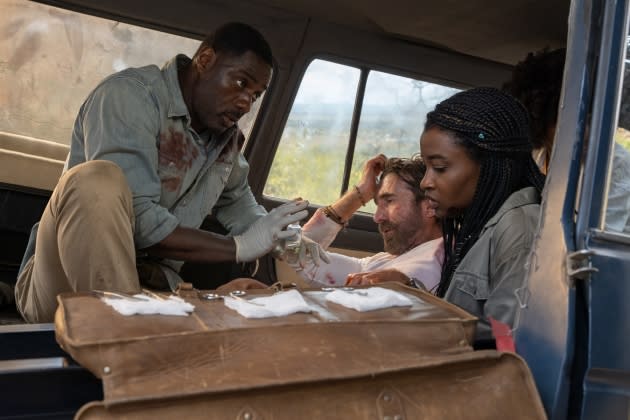‘Beast’: Idris Elba Battles the ‘Cujo’ of Lions
- Oops!Something went wrong.Please try again later.

“It’s the law of the jungle,” one character says fairly early on in Beast — “early” as in after we’ve established that a lion decides to become a four-legged vigilante once some poachers slaughter his pride, but before this one-cat army sets his sights on our hero and his family. The way the man inhales and pauses before he delivers the next line suggests he’s about to drop some serious science: “The only law that matters here.” Ah. Ok!
To be fair, there are other laws that also apply to this survivalist thriller. Like, for example, the Law of the Multiplex, which says that a movie primarily centered around a notable performer and a 10-words-or-less elevator pitch has to either a) rest steadily enough on that actor’s shoulders to carry it past pitfalls and weak spots, or b) revolve around such a too-big-to-fail, high-concept idea that it could level up anybody to A-list status. And the Law of the Reliable B-Movie Director, which declares that in the hands of someone without a discernible voice but who still knows how to hug the narrative curves, a simplistic slab of pulp can become transcendental. (This is known in some circles as the Delmer Daves Statute.)
More from Rolling Stone
And there is, of course, the Law of Man vs. Nature — can’t forget that ol’ narrative chestnut. It clearly states that, with human beings having transgressed against all creatures great or small for profit or out of malice or simply because Homo sapiens are straight-up a trash species, those creatures have been given license to bite back. Sometimes, a predator is just exercising his or her God-given right to be a predator. (Jaws gonna Jaws!). And sometimes…well, sometimes, it’s personal.
Beast plays loose and fast with all of these rules and regulations, testing that first one in particular by saddling Idris Elba with a sad-dad redemption story designed to up the stakes once the Chairman of the Roars begins his killing spree. His character, Dr. Nate Samuels, is a widower with two daughters: the still-curious tween Norah (Leah Jeffries) and the resentful, so-over-it teen Meredith (Iyana Halley). He had already separated from their mother before she succumbed to terminal cancer, though it’s strongly hinted, mostly from Norah, that he was never really there for them even before her death. So, as an attempt to collectively work their way through their grief, he’s taken them to Mom’s home village in Africa.
And, thanks to Martin (South African actor Sharlto Copley), one of Nate’s oldest friends — he was the guy who introduced the doctor to his late wife — the family will have a chance to lick their wounds and heal on the edge of a huge natural reserve where he works. This cheerful fellow is sort of like a game warden, though; he refers to himself as a “reserve enforcer.” He’s also a much-needed shoulder to cry on, since Nate bemoans the fact that he’s been a less-than-stellar father to his girls and feels that he’s losing them as adulthood looms on the horizon. Elba brings a lot of serious B.D.E. (Brooklyn Dad Energy) to these scenes, and while sensitive beats stoic when it comes to patriarchal anxiety, you can feel the script by Ryan Engle and Jaime Primak Sullivan testing the limits of parental self-consciousness and your tolerance. What Nate needs, clearly, is something that will allow him to prove to himself that he is family man. Well, will an enraged rogue lion do the trick?
In other words, if you’ve ever wanted to the man formerly known as Stringer Bell cold-cock the King of the Jungle, Beast is the movie of your dreams. Take that specific wish-fulfillment out of the equation, and what you’re left with is just a modern variation on a 1970s animal-slasher flick. Once the Cujo of the CGI-lion world has targeted the Samuels and their sidekick and stranded their car in the middle of nowhere, there’s a catch-and-release dynamic to Nate and his family’s close calls with a kitty who won’t take Hakuna Matata for answer.
You could do worse than handing this assignment to a director like Baltasar Kormákur, who seems to thrive when given stories involving survival (The Deep, Adrift, Everest) and men having their mettle tested overall (Contraband, 2 Guns). He’s also good at distracting you with technical bells and whistles, as when the party stumbles across an abandoned village that turns out to be a crime scene. His camera doesn’t just record the aftermath of a slaughter; it slithers, creeps, glides, and stalks its way around the carnage in a way that feels downright predatory. Still, transcendental it ain’t. Workmanlike is more like it. If he happens to stumble across a shot that feels poetically pulpy — say, a profile of Elba in full action-hero mode, backlit by a dusky horizon as his leonine executor crouches for an attack — that’s merely a bonus.
And the fact that it’s a Black family at the center of this survivalist tale is key, something that producer Will Packer has noted in the press leading up to the movie’s release. It’s a unique element in what otherwise feels like an extremely rote exercise — a cat-and-leading-man game that gives Elba a decent showcase but doesn’t quite meet its apparent goal of selling him as Liam Neeson 2.0. That could be a good thing. Maybe a career that detours into endless repetitions on the special-set-of-skills thing is not in the cards for the actor as he edges into his fifties. Let’s hope he avoids getting caught in that particular trap. And if he can stay away from thirsty-on-mane Jaws retreads that wear out their welcome a little too soon, all the better.
Best of Rolling Stone
